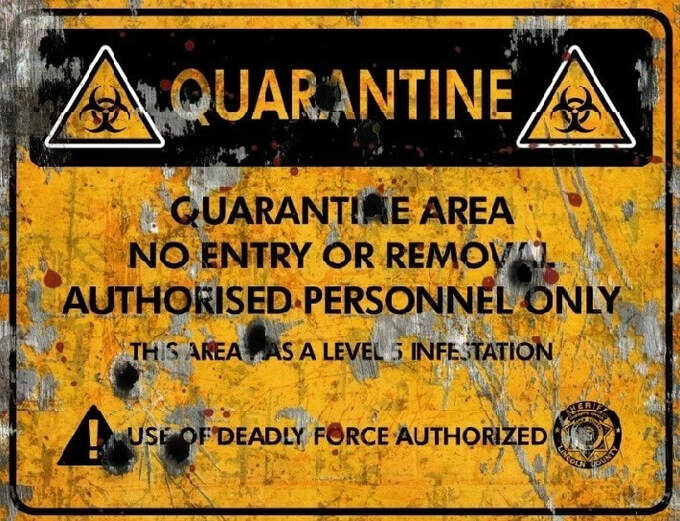What happens if the authorities require my business to close?
Does Business Income insurance respond if a business shuts down because of the coronavirus? What happens if the authorities require the business to close? There is a short answer to these questions, but it's not necessarily a simple answer. The short- and long-term impact of the coronavirus is anyone’s guess. Never before has the United States experienced such a significant interruption of business – and of everyday life. There are more questions than answers, each of which has potential implications, especially when it comes to insurance coverage. Many policies spell out limits and exclusions but few anticipated this atypical interruption of everything from supply chains to vacations. Even as this is written, creative claims and lawsuits are emerging. I receive calls and emails every day regarding the insurance implications of this virus, and the most common question relates to business income, specifically:
No, there is generally not business income coverage in this situation. That's the short answer. The longer and more difficult answer is it may all end up being determined by the courts in lawsuits that are most certainly coming, so the truth of the matter is we may not know the answer right now. If coronavrus (COVID-19) causes or results in damage to your business, coverage will depend on the specific facts of the claim and the specific policy’s language. All coverage decisions require an analysis of the claim’s unique facts against the specific terms of the policy, which can only be determined by your insurance carrier. Therefore, it's difficult to advise whether your business should or should not file a claim (the decision is ultimately yours to make, but it probably can't hurt to try). Before business income responds there must be damage to property leading to the cessation of a business. This requirement applies to business income dependent property losses (supply chain) and civil authority losses covered by business income policies. Additionally, there is a specific property exclusion applicable to viruses that will generally apply. This is true of “standard" business income forms; there may be some proprietary forms that respond, but these are rare. If it hasn't already done so, your organization should develop and implement a comprehensive Business Continuity Plan (BCP). A BCP is a very important part of your overall risk management and emergency procedures plan and should be one that includes the necessary steps to take in the event of an epidemic/pandemic. And, of course, always follow recommended precautions to keep yourself, your employees, and your visitors safe by staying up-to-date on all City, County, State and Federal notices, in addition to recommended travel restrictions and preventive measures. Above, I have provided a download link for a white-paper that gives a broad overview of how insurance generally responds to the Coronavirus peril. I'm not an attorney, so if you want legal opinions, you will need to go somewhere else for those; otherwise, the white-paper provides some basic guidance on insurance coverage. As always, feel free to reach out to Jon Jepsen at SentryWest Insurance Services if you need help or have additional questions. Disclaimer: This communication is not intended to provide any legal advice or opinion on any individual situation and should not be relied on to determine insurance coverage or lack thereof as relates the Coronavirus. Insurance forms and endorsements vary based on insurance company, changes in edition dates, regulations, court decisions, and state jurisdiction. The information is based on review of insurance coverages, sources we deem to be reliable and communications we have received from insurance companies and other resources. We make no representation or warranty as to the accuracy of information as applied to individual cases. Please advise our office if you want to submit any claim for coverage with your insurance companies.
Did you know that many 501(c)(3) nonprofit organizations have no paid employees? Volunteers provide a critical link between nonprofits and their communities by bringing needed skills, connections, insights and resources to the organization. In some cases, they also serve as valuable public advocates and ambassadors for the nonprofit. Some organizations only have a few volunteers, while others manage hundreds of volunteers – but the fact remains that volunteers are critical to the relationship between nonprofits and their communities.
It’s important that your volunteers know what they can expect in the way of guidance and supervision, as a lack of clear directions and/or difficulty in contacting a supervisor can cause frustration and lead to mistakes. While there are many ways in which to manage a volunteer workforce, consider checking your strategies against the list below to assure your nonprofit is following the best safety practices possible:
When using youth volunteers (anyone under the age of 18), you will want to think about their duties and responsibilities and whether those activities are suitable. There are several things to consider when engaging youth volunteers:
In addition to ensuring that volunteers are safe, don’t forget to show your appreciation on a regular basis! The importance of a simple verbal “thank you” cannot be overstated. Remember that a volunteer is an individual who performs hours of service for you without promise or expectation of compensation. Any compensation provided to a volunteer, such as a stipend, may inadvertently convert your volunteer into an employee. It can also jeopardize the legal protection for the volunteer under the Volunteer Protection Act. While the law provides some relief for the negligent acts of volunteers, these laws vary widely from state to state and are often misunderstood. And, don’t make the mistake of assuming that your nonprofit will be exempt from liability because its purposes are charitable, or because the person responsible for the harm is a volunteer. Managing volunteers is similar to managing paid staff. As with your staff, volunteers expect to be provided with rewarding experiences, treated with respect, trained as needed, properly supervised, and provided with feedback. Millions of volunteers across the country support our communities through all kinds of valuable service. And, they provide this service with an admirable record of safety. Since inadequate or improper training and oversight is frequently the cause of an incident and/or injury involving a volunteer, we hope these suggestions will help make that record of safety even better! Wouldn’t we all prefer to avoid incidents and injury to people and property and spend money on direct services rather than on expensive claims against the organization and volunteer? Courtesy: Nonprofits Insurance Alliance Group https://insurancefornonprofits.org/wp-content/uploads/Managing-Volunteers-2.pdf It’s time for March Madness! Are you planning a blowout that will make render an entirely new meaning to “bracket busting?” Has your neighborhood community center asked for a either a hold-harmless agreement or a damage deposit exceeding your current mortgage payment?
Welcome to the world of personal event risk management! I know, super exciting stuff. While businesses are typically well versed in the insurance and contractual agreement vagaries of booking meeting rooms or convention locations, many individuals only encounter such complexities when it comes time for the family reunion, wedding or NCAA finals/Super Bowl/World Series/Nascar or just name-your-favorite-sport excuse for a big bash party. When it comes to needing protection for such events, will your current insurance coverage ride to the rescue or leave you standing at the altar? Am I Covered? For example, let’s say you’re renting a local meeting hall or church activity center for your daughter’s wedding reception. The owner of the facility asks you to sign a written lease agreement, including a section that states you agree to hold them harmless from any liability claims against them arising from your activities at their location. Will your homeowners policy protect you for liability claims against you arising from the reception? And what about that contract and hold-harmless? Good news on both fronts! Standard home insurance policies include liability protection for claims against you arising from “insured locations.” While that obviously includes your actual home or apartment, it also typically includes other locations you occasionally borrow or rent purely for personal use. And as for the lease and hold-harmless agreement, your policy also includes coverage for liability assumed under a contract related to the maintenance or use of an “insured location.” Potential Issues So far, so good. But while liability arising for injury to a guest at the location certainly can represent a huge potential exposure to loss, don’t overlook other critical issues. Here are just a few:
Clearly taking on the responsibility for such events goes far beyond negotiation of rental fees, color coordination of the decorations, and who is going to drive Uncle Fred home after his 15th trip to the punch bowl. But that is no reason to cancel your plans! When it comes to insurance and risk management questions, help is right here, with Jon Jepsen of SentryWest Insurance in Salt Lake City, your Trusted Choice® independent insurance agent. We are waiting to help you review these and other concerns. We’re armed with answers for what is already provided by your current insurance—including options for filling any gaps. And we have risk management tips to eliminate or minimize many potential sources of loss for others. Jon Jepsen: keeping March Madness about sports, not your personal risk. Party on! |
AuthorJonny Jepsen, CIC Categories
All
|
||||||||
|
|
|




 RSS Feed
RSS Feed